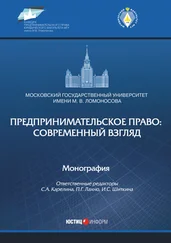«It seems to us that to oblige truly unwilling parties to refer their disputes to mediation would be to impose an unacceptable obstruction on their right of access to the court…»
Delivering his judgment in Wright [140], Ward LJ noted that in Halsey he had been persuaded by the argument that to order parties to mediate would fall foul of the right to a fair trial enshrined in Article 6 of the European Convention on Human Rights. In Wright, Ward LJ suggests that he may have been wrong to decide this point as he did in Halsey and rhetorically questions whether forcing the parties to go through an additional step before gaining access to court would in fact be an «unacceptable obstruction». Whilst he declines to answer this question, since the point was not before the court in Wright, he suggests that a «bold judge» may wish to accede to an invitation to rule on this question, in order that the Court of Appeal may revisit this aspect of Halsey in the light of developments in mediation practice over the last decade. Ward LJ also suggests in Wright that CPR 26.4(2) (b) (which allows a court at the allocation stage to stay proceedings of its own initiative in order for the parties to attempt ADR), might permit the court at any time to direct a stay for mediation to be attempted with the warning of adverse cost consequences for unreasonably refusing to attempt ADR» [141].
2. Ниже описаны «альтернативные» способы защиты прав, используемые в Великобритании помимо медиации. Какие вам известны «альтернативные» способы защиты прав, используемые в других странах (например, в странах Евросоюза, ЕврАзЭС и т. д.)?
«Conciliation
Conciliation is similar to mediation except that the neutral party actively helps the parties settle the dispute, for example, by suggesting settlement options. The term is widely used to describe the facilitated settlement discussions common in the employment arena.
Early Neutral Evaluation
The parties obtain from a neutral third party a nonbinding opinion regarding the likely outcome of the dispute if it were to proceed to trial. The rationale is that, armed with the opinion, the parties will be able to negotiate an outcome, with or without the assistance of a third party. Alternatively, they can settle the dispute on the basis of the evaluation provided. The Commercial Court and the Technology and Construction Court have schemes facilitating early neutral evaluation.
Expert Determination
This is an informal process by which the parties appoint an expert, who then gives a final and binding decision, usually on a limited technical issue.
Judicial Appraisal
Schemes are available whereby former judges and senior counsel are available to give preliminary advice on their views of the legal position in a dispute following representations from both parties. It is up to the parties to agree whether this opinion is to be binding or not.
Expert Appraisal
This involves the parties to a dispute jointly putting their case to an independent expert for review. The expert can be legally or technically qualified. Once the expert has given his views, the parties meet – usually at a senior level – to discuss the expert’s opinion and to try to settle the case.
Adjudication
Adjudication is a well-established method of dispute resolution in the construction industry – parties to certain construction contracts have a statutory right to refer disputes to adjudication. An adjudicator usually provides a decision on disputes as they arise during the course of a contract. Typically, the decision of an adjudicator has interim binding effect,
i. e. the decision is binding, pending the parties’ agreement altering its effect or a reference of a dispute to arbitration or litigation for final determination.
‘Med-Arb’
Initially, the parties submit their dispute to mediation. If no agreement is reached, the parties refer the matter to arbitration. The arbitrator may be the same person who has been acting as the mediator. This saves costs because the arbitrator already knows the facts of the case. However, there is a risk that, during the mediation, the parties will have given the arbitrator confidential information relating to their case.
Mini-Trial or Executive Tribunal
The parties present their case (in the form of timelimited submissions) to a panel comprising senior executives (one from each party) with authority to settle, and an independent chairperson. The panel then retires to discuss the dispute and the chairperson normally acts as a mediator between the senior executives. Unless the parties request, the chairperson does not make a binding determination. The entire process is private, confidential and without prejudice.
Final Offer Arbitration
The parties submit an offer of the terms on which they are prepared to settle to a neutral third party. The neutral third party then chooses one of the parties’ offers. Neither party should make an unrealistic offer because that might result in the neutral choosing the opponent’s offer.
Dispute Review Board
A panel (usually of three neutrals) is appointed at the start of a construction project. The panel visits the site of the project a few times a year, and deals with disputes by providing an interim binding decision. The parties can challenge board decisions via arbitration or litigation. The board can have a preventative effect on disputes. DRBs are often used for large scale construction projects, for example construction of the Olympic Stadium» [142].
Темы рефератов
1. Защита прав предпринимателей: правовые формы и способы.
2. Конституционные гарантии защиты прав предпринимателей.
3. Конституционный Суд РФ и защита прав предпринимателей.
4. Экономический спор: понятие, участники, содержание.
5. Особенности защиты прав предпринимателей в судах общей юрисдикции.
6. Нотариальная защита: понятие, правовые средства.
7. Особенности защиты прав предпринимателей в третейских судах.
8. Развитие «альтернативных» способов защиты прав предпринимателей в Российской Федерации.
Темы эссе
1. Законодательное решение об отнесении третейских судов к органам, уполномоченным осуществлять защиту нарушенных и оспоренных гражданских прав, породило дискуссию относительно проблемы соотношения компетенции государственных судов и третейских судов в РФ. Выразите свое мнение по данной проблеме.
2. В соответствии с положениями законодательства РФ признание и приведение в исполнение решений иностранных судов на территории РФ (выдача экзекватуры) при отсутствии международных договоров осуществляется на началах взаимности, если иное не предусмотрено федеральным законом. Сформулируйте свою точку зрения относительно вопроса о том, в какой степени указанное положение обеспечивает эффективность применения данного института на территории РФ.
Читать дальше
Конец ознакомительного отрывка
Купить книгу
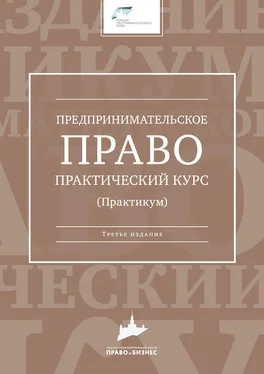
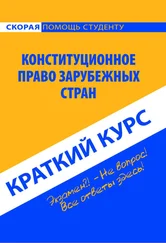

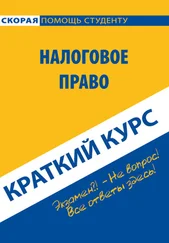
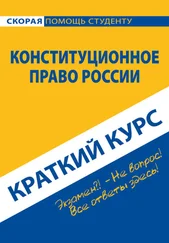
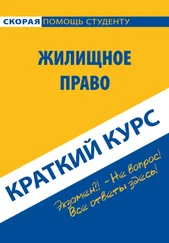
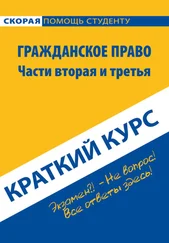
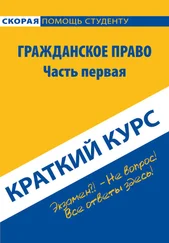

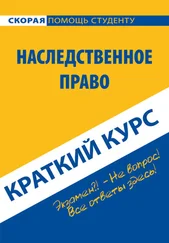
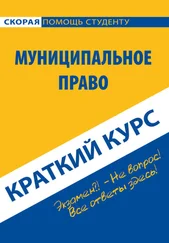
![Коллектив авторов - Гражданское право. Части вторая и третья. Краткий курс [litres]](/books/404815/kollektiv-avtorov-grazhdanskoe-pravo-chasti-vtoraya-thumb.webp)
